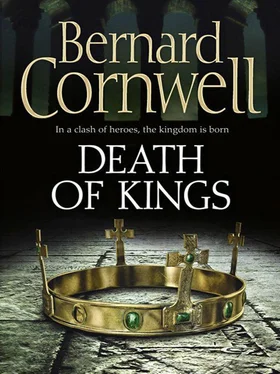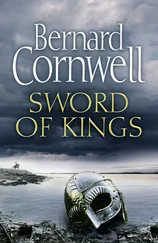‘He has,’ Steapa agreed.
‘Lost?’ Father Coenwulf asked.
‘This is his stronghold,’ I said, ‘and no one wants to defy us.’
At least no one wanted to defy us until we reached the entrance to Æthelwold’s hall. The gate was decorated with his flag and guarded by seven spearmen and blocked by a pathetic barricade of barrels on which two logs had been placed. One of the spearmen strode towards us and levelled his weapon. ‘No further,’ he announced.
‘Just take away the barrels,’ I said, ‘and open the gate.’
‘State your names,’ he said. He was a middle-aged man, solidly built, grey-bearded and dutiful.
‘That’s Matthew,’ I said, pointing at Father Coenwulf, ‘I’m Mark, he’s Luke and the other fellow got drunk and stayed behind. You know damn well who we are, so open the gate.’
‘Let us in,’ Father Coenwulf said sternly, after giving me a foul look.
‘No weapons,’ the man said.
I looked at Steapa. He had his long-sword at his left side, his short-sword on the right, and a war axe looped across his back. ‘Steapa,’ I asked him, ‘just how many men have you killed in battle?’
He was puzzled by the question, but thought about his answer. In the end he had to shake his head. ‘I lost count,’ he said.
‘Me too,’ I said, and looked back to the man who faced us. ‘You can take the weapons from us,’ I told him, ‘or you can live and let us through the gate.’
He decided he wanted to live and so ordered his men to remove the barrels and logs, then pull the gates wide, and we rode into the courtyard where torches had just been lit and their wild flames cast fluttering shadows from saddled horses that waited for riders. I counted about thirty men, some in mail and all armed, waiting with the horses, but not one challenged us. Instead they looked nervous. ‘He’s getting ready to flee,’ I said.
‘You are not to talk here,’ Father Coenwulf said testily.
‘Be quiet, you dull priest,’ I told him.
Servants came to take our horses and, as I expected, a steward demanded that Steapa and I give up our swords before we went into the great hall. ‘No,’ I said.
‘My sword stays,’ Steapa said menacingly.
The steward looked flustered, but Father Coenwulf just pushed past the man and we followed him into the great hall that was lit by a blazing fire and by candles arrayed on two tables between which was a throne. There was no other word to do justice to that great chair, which reared high above the massed candles and in which Æthelwold sat, though the moment we appeared he jumped to his feet and strode to the edge of the dais on which the throne had pride of place. There was a second chair on the dais, much smaller and pushed to one side, and Æthelflaed sat there, flanked by two men carrying spears. She saw me, smiled wryly and raised a hand to indicate that she was unharmed. Over fifty men were in the hall. Most were armed, despite the steward’s efforts, but again no one threatened us. Our appearance seemed to have caused a sudden silence. These men, like those in the courtyard, were nervous. I knew a few of them and sensed that the hall was in two minds. The youngest men closest to the dais were Æthelwold’s supporters, while the older men were his thegns, and they were the ones who were plainly unhappy at what was unfolding. Even the dogs in the hall looked whipped. One whined as we entered, then slunk to the hall’s edge, where he then lay shivering. Æthelwold was standing at the dais’s edge with folded arms, trying to look regal, but to me he seemed as nervous as the dogs, though a fair-haired young man beside him was full of energy. ‘Take them prisoner, lord,’ the young man urged Æthelwold.
There is no cause so hopeless, no creed so mad, no idea so ludicrous that it will not attract some believers, and the fair-haired youngster had plainly adopted Æthelwold’s cause as his own. He was a handsome brute, bright-eyed, strong-jawed and strongly built. He wore his hair long and tied behind his neck with a leather ribbon. A second ribbon was around his neck like a thin scarf and it looked oddly feminine because it was pink and made of the precious and delicate silk that is brought to Britain by traders from some far-off land. The tails of the silk ribbon hung over his mail, which was finely wrought, probably made by the expensive smiths in Frankia. His belt was panelled with gold squares and the hilt of his sword was decorated by a crystal pommel. He was rich, he was confident and he faced us belligerently. ‘Who are you?’ Father Coenwulf demanded of the youngster.
‘My name is Sigebriht,’ the young man said proudly, ‘Lord Sigebriht to you, priest.’ So that was the young man who had carried messages between Æthelwold and the Danes, Sigebriht of Cent, who had loved the Lady Ecgwynn and lost her to Edward. ‘Don’t let them talk,’ Sigebriht urged his patron, ‘kill them!’
Æthelwold did not know what to do. ‘Lord Uhtred,’ he greeted me, for want of anything else to say. He should have ordered his men to chop us to pieces, then led his forces out to attack Edward, but he was not man enough, and he probably knew that only a handful of the men in the hall would follow him.
‘Lord Æthelwold,’ Father Coenwulf spoke sternly, ‘we are here to summon you to the court of King Edward.’
‘There is no such king,’ Sigebriht yapped.
‘You will be accorded the dignity of your rank,’ Father Coenwulf ignored Sigebriht and spoke directly to Æthelwold, ‘but you have disturbed the king’s peace and for that you must answer to the king and his Witan.’
‘I am king here,’ Æthelwold said. He drew himself up in an attempt to look regal. ‘I am king,’ he said, ‘and I shall live or die here in my kingdom!’
For a moment I almost felt sorry for him. He had indeed been cheated of the throne of Wessex, thrust aside by his uncle Alfred and forced to watch as Alfred made Wessex into the most powerful kingdom of Britain. Æthelwold had found consolation in ale, mead and wine, and in his cups he could be good company, yet always there had been that ambition to right what he saw was the great wrong done to him in childhood. Now he tried so hard to be kingly, yet even his own followers were not prepared to follow him, all but for a handful of young fools like Sigebriht.
‘You are not king, lord,’ Father Coenwulf said simply.
‘He is king!’ Sigebriht insisted and stepped towards Father Coenwulf as if he would beat the priest down, and Steapa took one pace forward.
I have seen many formidable men in my life, and Steapa was the most frightening. In truth he was a gentle soul, kind and endlessly considerate, but he was a head taller than most men and blessed with a bony face over which the skin seemed to be stretched into a permanently bleak expression that suggested ferocity without pity. At one time men had called him Steapa Snotor, which meant Steapa the Stupid, but it was years since I had heard that jibe. Steapa had been born a slave, but had risen to become the head of the royal bodyguard, and though he was not swift of thought, he was loyal, painstaking and thorough. He was also the most feared warrior of all Wessex and now, as he put one hand on the hilt of his enormous sword, Sigebriht just stopped and I saw the sudden fear on that arrogant young face.
I also saw Æthelflaed smile.
Æthelwold knew he had lost, but he still tried to hold on to his dignity. ‘Father Coenwulf, isn’t it?’ he asked. ‘Yes, lord.’
‘Your counsel will be wise, I am sure. Perhaps you would give it to me?’
‘That is why I am here,’ Coenwulf said.
‘And say a prayer in my chapel?’ Æthelwold gestured to a door behind him.
‘It would be a privilege,’ Coenwulf said.
Читать дальше
Конец ознакомительного отрывка
Купить книгу












